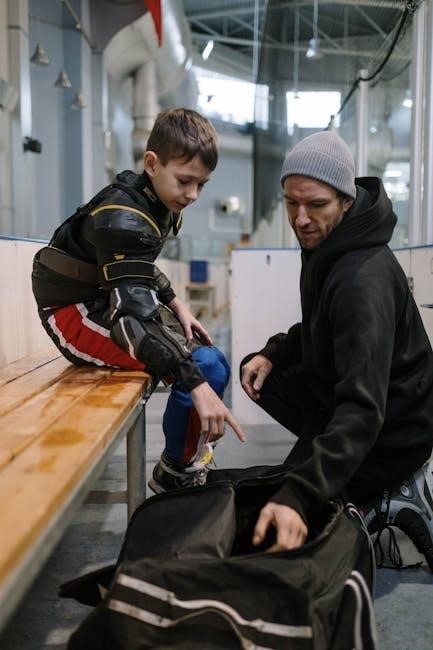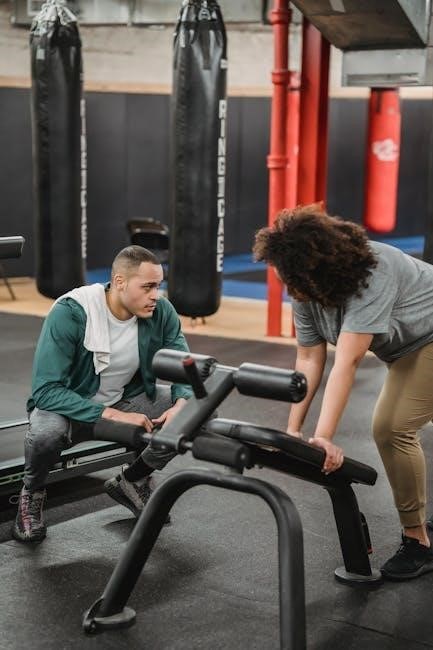Instructional coaching is a professional development process where coaches work with teachers to enhance teaching practices and student learning outcomes. Coaches provide guidance, support, and resources to help educators improve instructional strategies and address classroom challenges effectively.

Education Requirements for Instructional Coaches
A Bachelor’s degree in Education or a related field is typically required to become an instructional coach. A Master’s degree is often necessary for advanced roles, providing deeper expertise in instructional strategies and leadership.
Bachelor’s Degree in Education or Related Field
Earning a Bachelor’s degree in Education or a related field, such as Elementary Education, Secondary Education, or Special Education, is typically the first step to becoming an instructional coach. This degree provides foundational knowledge in teaching methodologies, curriculum design, and classroom management, which are essential for supporting teachers. Many instructional coaching programs require applicants to have this degree, as it demonstrates a strong understanding of educational principles and practices. While some coaches may have degrees in other areas, such as English or Mathematics, a background in Education is often preferred due to its direct relevance to teaching and learning. Additionally, coursework in areas like child development, educational psychology, and instructional technology can further prepare individuals for the role of an instructional coach. This degree also serves as a prerequisite for advanced certifications and graduate programs, which are often required for leadership roles in instructional coaching.

Master’s Degree for Advanced Roles
A Master’s degree is often required for advanced roles in instructional coaching, particularly for those aiming to transition into leadership positions. Many instructional coaches pursue a Master’s in Education, Curriculum and Instruction, or Educational Leadership to deepen their expertise; This advanced degree equips coaches with specialized knowledge in areas such as curriculum design, adult learning theory, and organizational development. It also prepares them to take on broader responsibilities, such as leading professional development initiatives or mentoring other coaches. Some programs offer a Graduate Certificate in Instructional Coaching, which can be pursued alongside or after a Master’s degree. These programs often include field experiences where coaches apply theoretical knowledge in real-world settings, analyze student data, and refine their coaching strategies. A Master’s degree not only enhances a coach’s credibility but also opens doors to higher-level positions, such as district-level instructional coaching or school leadership roles. It is a critical step for those seeking to expand their influence and impact within the education system.
Certifications and Training Programs
Certifications and training programs are essential for instructional coaches to enhance their skills. Many pursue a Graduate Certificate in Instructional Coaching or specialized programs like Google for Education’s Certified Coach Program. These programs provide research-backed methodologies and practical tools to support teachers effectively, ensuring alignment with educational standards and best practices.
Graduate Certificate in Instructional Coaching
A Graduate Certificate in Instructional Coaching is a specialized program designed to equip educators with the skills and knowledge needed to support teachers in improving instructional practices. This certification typically involves coursework, field experiences, and hands-on training, where participants apply coaching strategies in real classroom settings. Many programs require candidates to analyze student work, facilitate coaching conversations, and reflect on their practices through the lens of coaching theories. This certificate is often pursued by teachers seeking to transition into coaching roles or by current coaches looking to deepen their expertise. It focuses on developing competencies such as adult learning theory, communication, and data-driven instruction. The program also emphasizes the importance of empathy and emotional intelligence in building collaborative relationships with teachers. By completing this certificate, educators gain the tools to effectively mentor colleagues, enhance teaching practices, and ultimately improve student learning outcomes. It is a key step for those aiming to advance their careers in instructional coaching and educational leadership.
Leadership Certification for Advancement
Leadership certification is a valuable credential for instructional coaches aiming to advance their careers into administrative or district-level roles. This certification often focuses on developing skills such as strategic planning, policy development, and team management, which are essential for leadership positions. Many instructional coaches pursue leadership certification to transition into roles like assistant principal, curriculum specialist, or district coach. These programs typically include coursework on educational leadership, organizational change, and data-driven decision-making. Leadership certification is not always mandatory but is highly recommended for those aspiring to move beyond classroom or school-level coaching. It provides a pathway to influence educational practices on a larger scale and prepares coaches to take on responsibilities such as mentoring other coaches or leading professional development initiatives. By obtaining leadership certification, instructional coaches can enhance their expertise and readiness for advanced roles, ultimately contributing to systemic improvements in education. This certification complements the graduate certificate in instructional coaching and further equips professionals to lead and inspire educational teams effectively.
Essential Skills and Qualities
Instructional coaches need strong communication skills, emotional intelligence, and empathy to support teachers effectively. They must be adaptable, able to multitask, and possess a deep understanding of teaching practices and adult learning theory to foster professional growth.
Strong Communication Skills
Strong communication skills are foundational for instructional coaches, enabling them to build trust and collaboration with teachers. Coaches must actively listen to educators’ challenges, provide clear feedback, and articulate strategies effectively. They should communicate in a way that is empathetic, non-judgmental, and solution-focused, fostering a safe environment for professional growth. Effective communication also involves clarity in conveying ideas, whether through verbal or written means, ensuring that teachers understand and can implement suggested practices. Additionally, coaches must navigate conversations with sensitivity, recognizing the emotional aspects of teaching. By honing these skills, instructional coaches can facilitate meaningful dialogue, empower educators, and drive positive change in the classroom. Strong communication is not just about speaking but also about understanding and responding to the needs of teachers, making it a cornerstone of successful instructional coaching.

Emotional Intelligence and Empathy
Emotional intelligence and empathy are critical qualities for instructional coaches, as they work closely with teachers who may face diverse challenges. Coaches with high emotional intelligence can understand and navigate the emotional nuances of teaching, fostering a supportive environment for professional growth. Empathy allows coaches to connect with educators on a personal level, acknowledging the stresses and pressures of the classroom. This understanding helps build trust and encourages teachers to be open to feedback and new strategies. Coaches must also be self-aware, recognizing their own emotions and biases to maintain objectivity. By combining emotional intelligence with empathy, instructional coaches can tailor their support to meet the unique needs of each teacher, creating a collaborative and non-judgmental space for improvement. These qualities are essential for fostering meaningful relationships and driving positive change in educational settings. Emotional intelligence and empathy are not just skills but foundational traits that define effective instructional coaching.

Steps to Become an Instructional Coach
Becoming an instructional coach involves gaining teaching experience, often 3-5 years, followed by mentorship opportunities. Pursuing certifications and advanced degrees enhances credibility. Many coaches start by mentoring colleagues, then transition into formal coaching roles.
Gain Teaching Experience
Gaining teaching experience is a foundational step toward becoming an instructional coach. Most instructional coaches begin their careers as classroom teachers, where they develop a deep understanding of instructional strategies, classroom management, and student learning needs. Typically, 3-5 years of teaching experience is recommended before transitioning into a coaching role. During this time, teachers refine their skills in lesson planning, curriculum implementation, and assessing student progress. They also gain insight into the challenges teachers face, which is crucial for effective coaching. Additionally, teaching experience provides opportunities to work with diverse student populations, allowing coaches to develop strategies that cater to various learning styles and needs. This hands-on experience builds credibility and trust, essential for fostering collaborative relationships with educators. By mastering teaching practices, prospective coaches lay a strong foundation for supporting other teachers in improving their instructional techniques and enhancing student outcomes.
Mentorship and Coaching Experience
Mentorship and coaching experience are critical components in the journey to becoming an instructional coach. Many aspiring coaches start by mentoring new or struggling teachers, which helps them develop the skills needed to support educators effectively. Through mentorship, they learn how to provide constructive feedback, facilitate professional growth, and foster a collaborative environment. Coaching experience, whether formal or informal, allows individuals to practice techniques such as observing classrooms, analyzing teaching strategies, and leading professional development sessions. These experiences help build confidence and refine the ability to tailor support to meet the unique needs of teachers. Additionally, mentoring and coaching opportunities allow individuals to apply theoretical knowledge gained from certifications or graduate programs in real-world settings. This hands-on practice is essential for understanding how to navigate the complexities of adult learning and organizational dynamics within schools. By gaining mentorship and coaching experience, future instructional coaches develop the expertise and interpersonal skills necessary to empower teachers and enhance student learning outcomes.
Best Practices for Instructional Coaches
Best practices for instructional coaches include using data-driven strategies, fostering collaborative relationships, and applying research-backed coaching models. Coaches should focus on teacher empowerment, personalized support, and continuous improvement to enhance teaching effectiveness and student success.

Data-Driven Instructional Strategies
Data-driven instructional strategies are essential for instructional coaches to enhance teaching effectiveness and student outcomes. Coaches analyze student performance data to identify areas for improvement and develop targeted interventions. By assessing learning metrics, coaches can guide teachers in selecting evidence-based practices tailored to their students’ needs. This approach ensures that instructional decisions are grounded in measurable outcomes rather than intuition alone.

Coaches collaborate with teachers to implement data-driven strategies, such as formative assessments, progress monitoring, and differentiated instruction. These methods allow educators to track student growth and adjust teaching techniques accordingly. For instance, coaches might help teachers use learning analytics to identify knowledge gaps and design interventions to address them. By focusing on data, coaches empower teachers to make informed decisions that directly impact student success.
Instructional coaches also model how to interpret and apply data effectively. They facilitate professional discussions about student performance and provide resources to support data-informed teaching. This collaborative process not only improves instructional practices but also fosters a culture of continuous improvement within schools. Ultimately, data-driven strategies enable coaches to maximize their impact on both teaching quality and student achievement.
Building Collaborative Relationships

Building collaborative relationships is a cornerstone of effective instructional coaching. Coaches must establish trust and rapport with teachers, administrators, and other stakeholders to foster a supportive learning environment. By listening actively and demonstrating empathy, coaches create a safe space for educators to share challenges and explore solutions.
Collaborative relationships are built on mutual respect and open communication. Instructional coaches work closely with teachers to identify strengths, address areas for growth, and develop personalized improvement plans. They also partner with school leaders to align coaching efforts with broader educational goals. This teamwork ensures that coaching initiatives are integrated into the school’s culture and contribute to collective success.
Coaches often facilitate professional learning communities, where teachers collaborate to share strategies and best practices. By fostering these connections, coaches help create a network of support that extends beyond individual classrooms. Strong collaborative relationships not only enhance teaching practices but also promote a culture of continuous improvement and shared responsibility for student success.

Continuous Professional Development
Continuous professional development is essential for instructional coaches to stay updated on educational trends and effective strategies. Engaging in workshops, training, and networking ensures they provide relevant support and align their practices with school goals.
Engaging in Professional Learning
Engaging in professional learning is a cornerstone of becoming an effective instructional coach. Coaches must commit to ongoing education and training to stay updated on best practices, educational research, and innovative teaching strategies. This involves participating in workshops, conferences, and online courses that focus on topics such as adult learning theory, instructional design, and leadership development. Many instructional coaches pursue graduate programs or certifications to deepen their expertise. Additionally, professional learning communities and peer networks provide opportunities for coaches to share experiences and gain insights from others in the field. By continuously expanding their knowledge and skills, instructional coaches can better support teachers in improving classroom practices and student outcomes. This commitment to lifelong learning ensures that coaches remain relevant and effective in their roles, enabling them to address evolving educational challenges and opportunities.
Networking with Other Coaches
Networking with other instructional coaches is a vital component of professional growth and effectiveness. Building relationships with fellow coaches provides opportunities to share strategies, challenges, and successes, fostering a collaborative environment. Coaches can learn from one another’s experiences, gaining new insights and approaches to support teachers and students. Professional organizations, conferences, and online forums offer platforms for connecting with coaches from diverse backgrounds. These networks often share resources, such as coaching models, tools, and research, which can enhance one’s practice. Additionally, mentorship opportunities arise from these connections, allowing coaches to refine their skills and address specific challenges. Networking also helps coaches stay informed about educational trends and innovations, ensuring they remain relevant and effective in their roles. By fostering these professional relationships, instructional coaches can create a supportive community that collectively elevates teaching and learning outcomes. This collaborative approach strengthens the coaching profession as a whole, benefiting educators and students alike.

The Role and Impact of Instructional Coaches
Instructional coaches play a crucial role in enhancing teaching methods and student outcomes. By supporting educators in adopting effective strategies, they foster improved learning environments and contribute to the overall success of educational institutions and student achievement.
Role in Improving Teaching Practices
Instructional coaches play a vital role in enhancing teaching practices by collaborating with educators to identify areas for improvement. They provide personalized feedback, model effective strategies, and facilitate professional development opportunities. Coaches work closely with teachers to analyze student data, align instruction with curriculum standards, and implement evidence-based methods. By fostering a growth mindset, they empower teachers to refine their skills and adapt to new educational trends. Coaches also support the integration of technology and innovative teaching tools, ensuring classrooms remain dynamic and engaging. Their expertise in adult learning theory enables them to design targeted interventions that address specific teaching challenges. Ultimately, instructional coaches contribute to a culture of continuous improvement, helping educators deliver high-quality instruction that meets the diverse needs of all students. Their work directly impacts teacher confidence, classroom effectiveness, and overall student success.
Impact on Student Learning Outcomes
Instructional coaching has a profound impact on student learning outcomes by enhancing the quality of teaching practices. Coaches work with teachers to implement evidence-based strategies, align instruction with curriculum standards, and use data to inform decision-making. This collaboration leads to more effective lesson planning, improved classroom management, and increased student engagement. As a result, students often demonstrate better academic performance, higher test scores, and improved critical thinking skills. Coaches also help teachers identify and address individual student needs, ensuring that all learners, including those who may be struggling, receive targeted support. By fostering a culture of continuous improvement, instructional coaches contribute to creating learning environments where students are more likely to succeed. The ultimate goal of instructional coaching is to empower teachers, which in turn empowers students to achieve their full potential; This ripple effect underscores the critical role coaches play in driving positive educational outcomes.
Leadership Opportunities Beyond Coaching
Instructional coaches often transition into school leadership roles, such as assistant principals or curriculum specialists, leveraging their expertise to influence district-wide initiatives and policy development. This career path offers opportunities to shape educational systems at a higher level.
Transitioning to School Leadership Roles
Instructional coaches often serve as a bridge between teaching and administrative roles, making them strong candidates for school leadership positions. Many coaches transition into roles such as assistant principals, curriculum directors, or district-level instructional leaders. These positions allow them to influence educational policies, oversee school improvement initiatives, and mentor other educators on a larger scale. The skills gained through coaching, such as data analysis, communication, and empathy, are highly transferable to leadership roles. Coaches who aspire to lead schools often pursue additional certifications or advanced degrees in educational leadership. Their experience in fostering collaboration and driving instructional improvement equips them to address systemic challenges and promote a culture of continuous learning. By leveraging their coaching expertise, they can create impactful change at the organizational level, supporting both teachers and students in achieving long-term success.
